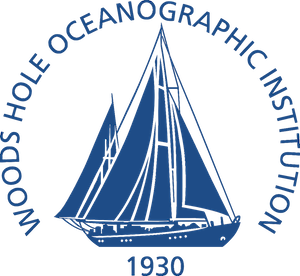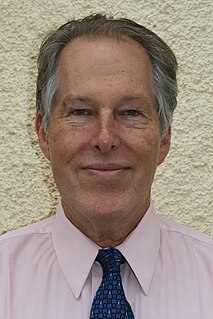Related Research Articles

The Woods Hole Oceanographic Institution is a private, nonprofit research and higher education facility dedicated to the study of marine science and engineering. Its agenda includes: geological activity deep within the earth; plant, animal, and microbial populations and their interactions in the ocean; coastal erosion; ocean circulation; ocean pollution; and global climate change.

The Scripps Institution of Oceanography in La Jolla, California, founded in 1903, is one of the oldest and largest centers for ocean and Earth science research, public service, undergraduate and graduate training in the world. Hundreds of ocean and Earth scientists conduct research with the aid of oceanographic research vessels and shorebased laboratories. Its Old Scripps Building is a U.S. National Historic Landmark. SIO is a division of the University of California San Diego (UCSD). The public explorations center of the institution is the Birch Aquarium at Scripps. Since becoming part of the University of California in 1912, the institution has expanded its scope to include studies of the physics, chemistry, geology, biology, and climate of Earth.

Ralph John Cicerone was an American atmospheric scientist and administrator. From 1998 to 2005, he was the chancellor of the University of California, Irvine. From 2005 to 2016, he was the president of the National Academy of Sciences (NAS). He was a "renowned authority" on climate change and atmospheric chemistry, and issued an early warning about the grave potential risks of climate change.

William Aaron Nierenberg was an American physicist who worked on the Manhattan Project and was director of the Scripps Institution of Oceanography from 1965 through 1986. He was a co-founder of the George C. Marshall Institute in 1984.
The Nierenberg Prize for Science in the Public Interest is given annually by the Scripps Institution of Oceanography. It was created through a gift of the family to honor the memory of William Nierenberg. The prize includes a bronze medal and $25,000.

Charles David Keeling was an American scientist whose recording of carbon dioxide at the Mauna Loa Observatory first alerted the world to the possibility of anthropogenic contribution to the "greenhouse effect" and global warming. The Keeling Curve measures the progressive buildup of carbon dioxide, a greenhouse gas, in the atmosphere.

Roger Randall Dougan Revelle was a scientist and scholar who was instrumental in the formative years of the University of California San Diego and was among the early scientists to study anthropogenic global warming, as well as the movement of Earth's tectonic plates. UC San Diego's first college is named Revelle College in his honor.
The Alexander Agassiz Medal is awarded every three years by the U.S. National Academy of Sciences for an original contribution in the science of oceanography. It was established in 1911 by Sir John Murray in honor of his friend, the scientist Alexander Agassiz.

Walter Heinrich Munk was an American physical oceanographer. He was a professor of geophysics at the Scripps Institution of Oceanography at the University of California, San Diego in La Jolla. Born to a prominent Austrian family, in 1932 Munk was sent to school in the United States at age 14. Abandoning a New York banking career, Munk obtained a scientific education at the California Institute of Technology and his doctorate from Scripps. During World War II, Munk and his doctoral advisor Harald Sverdrup developed methods for predicting surf conditions on beaches, saving countless lives during allied landings in North Africa, the Pacific, and Northern Europe. After the war, Scripps grew from a small biological station to a major research institution. Munk and his wife Judy were active in developing the Scripps campus and integrating it with the new University of California, San Diego.
Edward David Goldberg was a marine chemist, known for his studies of pollution in the oceans.
Michael Selwyn Longuet-Higgins FRS was a mathematician and oceanographer at the Department of Applied Mathematics and Theoretical Physics (DAMTP), Cambridge University, England and Institute for Nonlinear Science, University of California, San Diego, USA. He was the younger brother of H. Christopher Longuet-Higgins.
Lynne Talley is an American physical oceanographer. A professor of physical oceanography at Scripps Institution of Oceanography, she has served as chief scientist on research ships, where she collected oceanographic hydrography data. She has participated in international steering groups and oversight committees for collection and use of oceanographic data. Talley is a Fellow of the American Meteorological Society, the American Geophysical Union, The Oceanography Society, the American Association for the Advancement of Science, and the American Academy of Arts and Sciences.

James J. McCarthy was a Professor of Biological Oceanography at Harvard and was President of the American Association for the Advancement of Science from February 2008 to February 2009.

Richard Chapin James Somerville is an American climate scientist who is a Distinguished Professor Emeritus at Scripps Institution of Oceanography at the University of California, San Diego, where he has been a professor since 1979.
Robert W. Corell is an American global climate scientist, principal for the Global Environment Technology Foundation, an ambassador for ClimateWorks, professor II at the University of the Arctic’s new Institute of Circumpolar Reindeer Husbandry and a professor II at the University of Tromso. He is a partner of the Sustainability Institute and its C-ROADS Climate Interactive Initiative, and head of US Office for the Global Energy Assessment. In 1996 he was Awarded Brazilian Order of Scientific Merit by the President of Brazil. In 2003 a Mountain region in Antarctic was named the “Corell Cirque” in his honor. He contributed to the assessment reports of the Intergovernmental Panel on Climate Change, an organisation that was co-awarded the 2007 Nobel Peace Prize, and in 2010 he was awarded an honorary Doctor of Veterinarian Medicine by the Norges veterinærhøgskole . He joined the H. John Heinz III Center for Science, Economics and the Environment in 2006 as vice president for programs and policy.
The Prince Albert II Foundation is a Monaco-based charity which has donated millions in various environmental projects. The Foundation was initially created in 2006 by Prince Albert II of Monaco and it concentrates on environmental protection, sustainable development, climate change and the promotion of renewable energies as well as biodiversity. The Foundation supports also projects which develop water resource management or desertification control technologies.
Wolfgang "Wolf" Helmut Berger was a German-American oceanographer, geologist, micropaleontologist and emeritus professor at the Scripps Institution of Oceanography, University of California, San Diego. His research interests comprise "micropaleontology, marine sedimentation, ocean productivity, carbon cycle, ocean history, climate history, and history of oceanography."

Timothy Cole Gallaudet is an American oceanographer who is a retired Rear Admiral in the United States Navy. Gallaudet currently serves as the Assistant Secretary of Commerce for Oceans and Atmosphere within the U.S. Department of Commerce. In this function, he fulfilled the roles of Acting Under Secretary of Commerce for Oceans and Atmosphere, as well as Acting Administrator of the National Oceanic and Atmospheric Administration (NOAA) until February 28, 2019. He was the longest tenured Acting Administrator of NOAA in the organization's history.
References
- ↑ "Roger Revelle Prize". Scripps Institution of Oceanography. Retrieved 22 December 2014.
- ↑ Scripps to salute centennial of UCSD founder/oceanographer Roger Revelle
- ↑ San Diego gives Monaco's Prince Albert the royal treatment
- ↑ Scripps to Honor Prince Albert II of Monaco for his Environmental Efforts
- ↑ A Prize Fit for a Prince